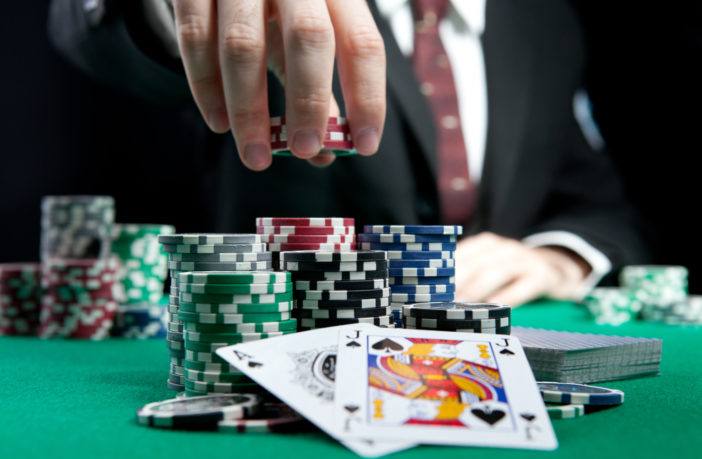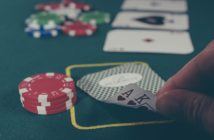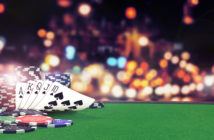As you’re probably aware, there is some dispute on whether poker is a game of skill or luck. Well, now the verdict is in, literally.
In Brooklyn, New York, 2012, a man was charged with illegal gambling for running a poker business. A federal judge cleared the charges, ruling that poker is, officially, a game of skill, not luck.
Unlike other casino games, poker is your only gambling option that doesn’t depend on luck at all. As long as you know how to bluff, read other players and bet, it really doesn’t matter what cards you get. The only gamble in poker is betting that your skills will overpower your opponents’.
The best part about this is it means poker is a game you can get better and better at. You can level up your skills, win more and make more money. And we’re going to teach you how.
In this guide, we’ve posted our best, and most overlooked, poker tips and tricks to make you a more profitable player. Read these tips and you’ll learn the skills to pay the bills.
Your Invitation to the Best Online Pokies in Australia
Like a punt on the slot machines?
Our top rated slots for October 2019 are the smash-hit online pokie sites: Ruby Fortune and Jackpot City Casino.
These sites include some impressive matched bonuses – up to $750 and $1600 respectively! With the potential for some seriously big wins, here’s your chance to get a piece of the action:
Lifestyle Choices for a Better Poker Game
Improving your poker skills isn’t only about what you do in the game. As with all competitions, it takes physical, mental and emotional training to prepare for the next event. Like a professional athlete, you’ll have to make certain lifestyle choices to stay at peak condition.
When a professional soccer player trains for the World Cup, he does a lot more than just practice soccer. He trains in various ways and structures his life around staying “game-ready.” In the same way, if you are serious about becoming a successful poker player, you’ll need to train hard.
Below are some lifestyle choices that will help you become a champion poker player.
1. Take Care of Your Body
Poker is a game of the mind, and it can stretch on for several hours. To strengthen your mind and keep up your stamina, you need to take care of your body.
Eat a diet of healthy foods, especially foods that improve brain function. Exercise regularly and get plenty of sleep. Being well-rested and healthy can make you the most alert and “on-your-game” player at the table.
2. Exercise Your Brain
In addition to working out your body, give your brain a workout as well. Schedule a few minutes a day to play brain-boosting games like Brain Age.
Play puzzle games like Tetris and Sudoku. Practicing math is also a great way to keep your brain sharp.
These activities improve your memory, cognitive functions and problem-solving skills. They also speed up your brain’s reaction time so you can make decisions and perform mental activities faster.
3. Meditation and Mindfulness
Controlling your emotions is a huge part of playing poker. That’s what having a “poker face” means.
Your opponents read your emotional reactions like an open book. Concealing your emotions is essential to your game.
Meditation and other mindfulness exercises are proven to strengthen emotional control. Try the following mindfulness techniques to power up your poker face. Additionally, YouTube is a good resource for learning these and other mindfulness techniques.
Meditation
Meditation is just a fancy word for focusing on the present moment. In modern society, we spend most of our thought-time preparing for the future or analyzing the past. Often, we get out of practice with looking around, observing what’s happening right now.
This type of lifestyle causes chronic stress that drains our emotional energy. It also inhibits our ability to deal with our present emotions. Meditation pauses the source of our stress and helps us deal with the present, refreshing our emotional stamina.
Since meditation is any activity where you focus on the present, there are endless ways to do it. You can simply stop what you’re doing and observe what’s happening around you: what you see, what you hear, what you feel. You can do this anywhere you are, or while taking a nice walk outside.
You can close your eyes and observe the present with your other senses. Or listen to your breathing.
You can make a delicious snack and eat it slowly with your eyes closed. Pay attention to the flavor of each bite.
How you meditate is up to you, but practice meditation regularly.
Breathing Exercises
Diaphragmatic breathing, also called “belly breathing,” is linked to a healthier emotional state. As babies, we all breathe this way.
But many of us have reconditioned our bodies to take shallow breaths. The following breathing exercise will retrain your body to breathe correctly for better emotional control.
Sit or lie comfortably. Place one hand on your chest and one hand on your diaphragm, just under your rib cage.
Slowly breathe in and out through your nose. If your nose is plugged up, breathe through pursed lips. Try to breathe so that your diaphragm rises and falls while your chest doesn’t move at all.
Practice this for 5-10 minutes at a time, 3-4 times per day. Eventually, this will reset your body’s default breathing method to diaphragmatic breathing.
Other Mindfulness Exercises
Yoga is another good way to practice mindfulness. Yoga stretches and breathing techniques help you focus on the moment and train your body to deal with stress.
Progressive muscle relaxation is the practice of focusing on and relaxing each part of your body individually. Here’s how you do it.
Lie comfortably and breathe slowly. Focus on your breathing for a minute or so. Then, from the top of your head to tips of your toes, you’re going to relax your muscle groups one at a time as follows.
Starting at the top of your head, imagine you are breathing relaxing energy into that particular muscle group as you inhale. As you exhale, feel those muscles relax and the stress melting out of them into the floor. If it helps, you can clench the muscles tightly while you inhale and release them when you exhale.
Do this until you have relaxed your entire body.
Before and After the Game
Here are some tips to practice immediately before and after a poker game.
4. Scout the Competition
Don’t pick tables at random. Take some time to observe the other players before you sit down.
This way, you can try to make sure you’re the best player at the table before you sit down. You’ll also get a head start on reading the other players without the distraction of worrying about your own hand.
5. Study After Each Game
When you finish a game, take some time to analyze how you played. Take notes on what you did right and what you need to work on while it’s fresh in your mind. Plan how you are going to practice for the next game.
In-Game Poker Tips
Now, here are some sneaky poker tips to use during the game.
6. Don’t Drink
There’s a reason casinos give free drinks to gamblers. Drunk gamblers are careless gamblers.
Alcohol will hinder all your well-trained abilities. It will take you right off your game and into Loserville. As tempting as it is, just say, “No,” to drinking while playing.
7. Take Breaks
As stated earlier, poker is a mental game. Playing too long can take its toll on your mind. If you notice your game slipping, take a break to refresh your senses.
Similarly, don’t game too many days in a row. You need to give your mind a chance to rest. After a game, wind down with the mindfulness techniques listed above.
8. Be Unpredictable
Surely you’ve read up on poker strategy and have chosen and practiced the strategy you think works best. That’s a good start. But an experienced poker player is going to pick up on your one strategy fairly quickly and start anticipating your plays.
If you’ve become proficient at one strategy, you can do it with other strategies, too. And you should!
Instead of one strategy, learn and practice several, as many as you can. Never use any single strategy for very long but keep switching strategies randomly. This makes you unpredictable and impossible to anticipate.
Meanwhile, keep reading the other players. Get in their heads while keeping them out of yours.
9. Fake Tells
Here’s a more specific way to be unpredictable. Give off fake tells to manipulate or confuse other players.
The one that works best is timing tells. A common timing tell is betting quickly with poor or mediocre hands and pausing longer to consider how to bet with a strong hand.
It’s a good practice to know how long it takes you to bet with a strong hand and then count that amount of time with every single hand. This eliminates timing tells completely.
But a better practice is to decide on a fake timing tell strategy beforehand. At the start of the game, tell your weak hands by betting quickly. Then, change your timing later in the game.
Now you can bluff unnoticed when you suddenly pause with a weak hand as if it were a strong hand. Also, you can decide before the game how to bet on certain strong hands so you can bet quickly when they come up.
10. Practice Conversation
You may avoid conversation at the table because it’s distracting. If so, you’re missing out on an important poker skill.
If it’s distracting for you, it’s distracting for other players, too. Instead of letting conversation distract you, use conversation to distract others.
While they can try to anticipate your playing, they can’t anticipate your conversation. Conversation demands their attention and interaction, which forces them to have less focus on the game. It may be enough to give you the edge.
Plus, it’s not going to distract you because you’re going to practice! Before you head to the casino, practice your conversational skills.
Mentally prepare for a variety of topics you can bring up at the table. Rehearse your answers to common small-talk questions so you can say them without thinking.
Practice topical questions that require a thoughtful answer. Play ad-lib acting games with your friends.
This training makes friendly conversation your secret weapon. The other players will focus on your conversation while you’re free to focus on the game.
Practice These Poker Tips to Become a Pro Player
Successful poker playing requires serious training. In addition to the poker strategies you already practice, start practicing these poker tips to up your game.
Want more sneaky gambling tips? Read 10 Secret Gambling Tips that will make you money.







